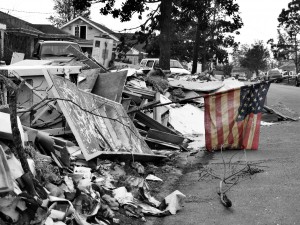In August 2005, Hurricane Katrina devastated our country. It not only flooded cities, destroyed buildings, and displaced people off the Gulf region– it somehow displaced all of us. I remember being struck by a photo of an older, Black woman, suddenly homeless, wrapped in an American flag. It seemed impossible to believe that this could happen to “us” – Americans in America. The storm unfolded layers of complications and injustices that revealed people of color were disproportionately impacted by the storm – in part because their lives were tenuous before the storm began. That systematic racism and poverty had swept them away like so much debris in the force of the storm and the country’s response to it.

a small sign of hope – a mud-stained and tattered American flag stands in a pile of debris left by Hurricane Katrina in Chalmette, Louisiana
Ten years ago, it felt like the scales had fallen from our eyes and in the bright, new light we repented. From the robust conversation about power, privilege, and prejudice, it seemed we were on the verge of understanding something fundamentally “wrong” with ourselves and how we treat one another. That with this understanding we would be able to bring about the kind of change that would genuinely support our national vision where all people are created equal, with right to life, liberty, pursuit of happiness – where no one would be abandoned on their rooftop in times of storm or calm.
Like now, in 2005 the conversation about race in our nation seemed urgent and important. Then it went silent. Not all at once, but gradually fading away. There was other news. The post-storm “normal” was not worth reporting and we became swept up in our daily lives. We forgot the urgency around race. We left the conversation mid-sentence. The underlying realities, inequalities and injustices remained and we forgot that the next storm would mean people returning to the roof.
Now, current events related to race, are sweeping the nation like a storm and breaking the levees of the status quo. After the shootings in Charleston and the publicity about mass incarceration and the public awareness about police brutality, we are again on the road to Damascus. We are seeing with new eyes and a repentant heart that racism is a sin that destroys us all. We are vowing to make a change.
And I can only pray this is true. That, this time, we will stay the course. I pray that we will finish what we have begun, truly addressing the issues and social forces that divide us from one another. I pray that we will heed the call to care for the widow, the orphan – those most vulnerable in our society. My hope is that our hearts will remember the urgency to see the work to completion.
My fear is that we will look away, work unfinished, again.
As Director of Intercultural Ministries, Gimbiya Kettering seeks to continue and expand the conversation and ministry work for those working in intercultural and cross-cultural settings. To join the conversation leave a comment or email her directly at gkettering@brethern.org.

